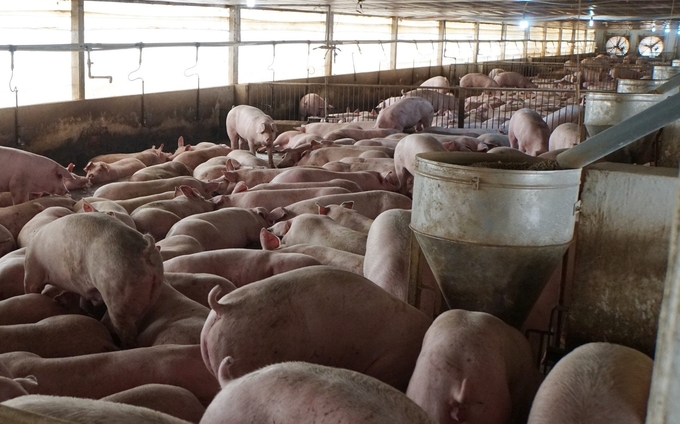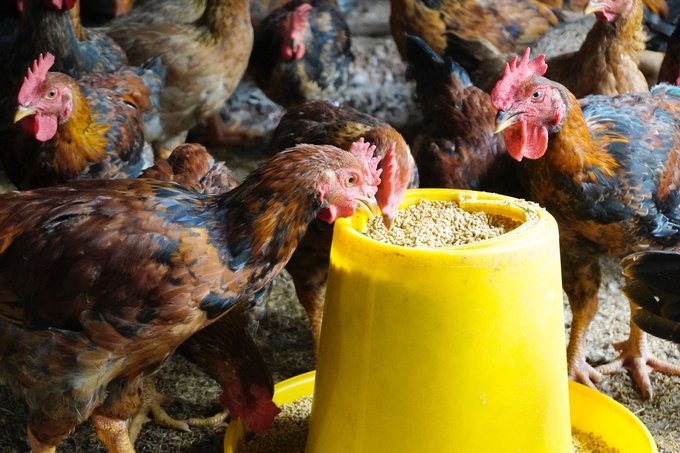October 4, 2025 | 19:35 GMT +7
October 4, 2025 | 19:35 GMT +7
Hotline: 0913.378.918
October 4, 2025 | 19:35 GMT +7
Hotline: 0913.378.918
Mr. Pham Kim Dang assessed, Vietnam’s livestock industry presents unique characteristics that are different from other countries in the world. Because we still have to develop sustainably but also ensure livelihoods for small-scale and household farming and develop without compromising the environment. That is also the direction that the government has given to the Ministry of Agriculture and Rural Development and the industry for guiding the livestock sector in the near future. And because of that, we have to face many challenges different from other countries.

Mr. Pham Kim Dang, Deputy Director of the Department of Livestock Production assessed, Vietnam’s livestock industry presents unique characteristics that are different from other countries in the world. Photo: Hong Tham.
According to Mr Pham Kim Dang, the first challenge lies in biosecurity, disease control, and food safety. Given the prevalence of scattered small-scale and household farms, family-run slaughterhouses and traditional distribution systems, it is extremely difficult to ensure adequate biosecurity, disease control, and food safety. Changing mindsets and implementing effective management systems is a significant hurdle for the industry.
The second major challenge is environmental pollution. Each year, the livestock industry releases a massive amount of waste into the environment, including over 60 million tons of solid waste and approximately 300 million tons of liquid waste. Given the government's commitment at COP26 to achieve net-zero emissions, the livestock sector must adapt to more sustainable practices.
The third challenge is the heavy dependence of our livestock industry on imported raw materials, particularly for feed production. Although Vietnam ranks first in the production of industrial feed in Southeast Asia, producing around 20 million tons annually, we import 16 - 17 million tons of feed ingredients. This reliance on imports, which account for 65 - 70% of our feed production, translates into a dependency valued at approximately 6 - 8 billion dollars.
According to data from the General Department of Customs, in the first 7 months of 2024, Vietnam spent 2,91 billion USD to import animal feed and raw materials, a slight increase of 2,2% over the same period last year.
Enterprises with foreign direct investment spent 1,22 billion USD to import this product, corresponding to an increase of 5% over the same period. Domestic enterprises imported animal feed and raw materials with 1,69 billion USD, a slight increase of 0,1% over the same period last year.
Accumulated in the first 7 months of 2024, Argentina is the largest market supplying animal feed and raw materials to Vietnam with 827 million USD, an increase of 10,8% over the same period last year. Behind is the US with 652 million USD, up 56% over the same period last year., Brazil with 404 million USD, down 14% over the same period last year..
Vietnam also spent 248 million USD importing animal feed and raw materials from China, an increase of 53% over the same period last year; India with 109 million USD, a deep decrease of 70% over the same period last year..
Among the largest markets, Vietnam imports animal feed and raw materials from two ASEAN markets, including Indonesia with a turnover of 81 million USD, an increase of 12,8% over the same period; Imported from Thailand with 122 million USD, up to 65% in value compared to the first 7 months of 2023.
The fourth challenge is the low level of integration within our livestock value chains. As a result, when market conditions fluctuate, farmers, being the primary producers, are the most vulnerable and suffer the greatest losses.

Vietnam’s livestock industry has to face many challenges different from other countries. Photo: Hong Tham.
The fifth challenge arises from our participation in global trade, particularly our commitments under free trade agreements. Our livestock industry is facing intense competition due to its lack of competitiveness. Firstly, the high costs associated with improving biosecurity, disease control, and food safety; secondly, our heavy reliance on imported feed ingredients, which drives up production costs and hinders our ability to compete effectively.
The final challenge is related to climate change and the unique climatic conditions in Vietnam. Climate change has impacted the entire globe, including Vietnam, but our country's diverse climate poses unique challenges. Vietnam experiences a wide range of climatic conditions found across the world, which directly and indirectly affects the operations of our livestock industry.
“These are the primary challenges that Vietnam’s livestock industry will need to address in the near future”, said Mr Pham Kim Dang.
In the same opinion, Ms. Rungphech (Rose) Chitanuwat, Regional Portfolio Director - ASEAN, Informa Markets said that, Vietnam's agricultural sector in general and Vietnam's livestock sector in particular have many small and medium-sized businesses and households. Therefore, the challenge here is food safety. Livestock households need to pay more attention to biosafety.
Besides, the biggest challenge is climate change. Temperature in livestock farming is very important. The poultry will not develop if it is too hot or too cold, for example, in Hanoi and Ho Chi Minh City, there is already a big difference in weather. With the impact of weather change, livestock households need to know how to use technology to adjust temperature.
Moreover, the agricultural waste in Vietnam is still high. The challenge here is how we can support farmers to use innovations and new technologies to take advantage of available resources and reduce emissions from agriculture.
Translated by Hong Tham

(VAN) Quang Ngai provincial authorities have fined three fishing boat captains a total of nearly VND 1.1 billion (around USD 44,000) and suspended their captain licenses for nine months for multiple violations on fishing regulations.

(VAN) The OPTOCE project, supported by Norway, helps Vietnam achieve dual benefits: reducing plastic leakage into the environment and decreasing cement industry’s reliance on coal.

(VAN) The 47th ASEAN Ministers on Agriculture and Forestry (AMAF) meeting approved the Food, Agriculture and Forestry Sector Plan of Action 2026-2030, which focuses on six priority areas.

(VAN) The Mekong River Commission strengthens cooperation with China and Myanmar and develops a strategic orientation for the 2026 - 2030 period.

(VAN) A loan of nearly 145 million USD from the Integrated Resilient Development Project will support Vietnam on disaster risk management and sustainable infrastructure.

(VAN) The German Agency for International Cooperation (GIZ) will support Viet Nam in technology transfer to build an affordable, net-zero energy system.

(VAN) With CPV’s co-host status, the event becomes even more attractive for industry professionals seeking strategic partnerships, market visibility, and sustainability driven solutions.